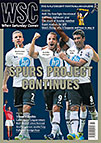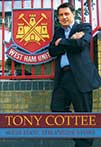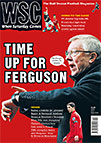 A year on the road
for Soccer Saturday
A year on the road
for Soccer Saturday
by Johnny Phillips
Bennion Kearny, £9.99
Reviewed by David Harrison
From WSC 320 October 2013
Buy this book
Johnny Phillips is a product of Sky’s Soccer Saturday conveyor belt constructed to provide Jeff Stelling with a never-ending stock of earnest reporters, ready to update the nation with breathless goalflashes. That was until Phillips briefly lost it on-air at the end of last season and went from calmly “delivering his own brand of footballing brilliance”, as Stelling’s foreword generously describes our man’s contribution, to a demented comedy figure screaming a match update in a ludicrous high-pitched falsetto. Those 20 seconds in May elevated him, we’re told, to “an internet sensation with millions of hits”.
To be fair that Watford v Leicester play-off semi-final did deliver the most extraordinary climax and Phillips performed manfully, albeit squeakily, to keep it together and provide any sort of factual assessment, what with flares going off and a fair old pitch invasion gathering pace behind him.
In many ways those Vicarage Road scenes served as a perfect bookend to the season Phillips had enjoyed as he travelled the land on behalf of Sky. The cynic might suggest that if you’re about to release a season-long diary, national exposure along those lines does no harm. But whatever criticisms one may choose to level at this undemanding tome, cynicism would not feature.
Phillips has chronologically documented 24 trips he made during the course of last season, starting in August with a delightful little story about how celebrity Spireite the Duke of Devonshire invited his local team to train within the magnificent 100-acre gardens of his Derbyshire ancestral seat, Chatsworth House. What Capability Brown would have thought is anyone’s guess but it’s a charming tale with which to set the ball rolling.
What follows is distinctly mixed but this is the archetypal bedside book, in that the reader could happily flip from one month to the next and back. There are short stories based around key characters within smaller clubs who rarely make headlines – the likes of Fleetwood, Mansfield, Forest Green and Met Police – as well as tales of football people.
The chapter on Brentford’s troubled goalkeeper Richard Lee is revealing if hardly original and the story of Port Talbot ambulance driver and former Swansea striker James Thomas is another pleasing read, while the piece on Lee Hendrie is refreshingly upbeat. The most interesting essay covers the rise and fall of Gretna, intertwined with the story of the club’s late benefactor, the extraordinary Brooks Mileson.
Phillips is a Wolves fan and indulges himself to some degree with a reflective piece on his lengthy relationship with them but the section on finding his club and recollections of 1980’s terrace life will strike a chord with many. This is no Sports Book of the Year contender. Some of the grammar is painful – “The esteem in which he [Benítez] is held by Liverpool fans is considerably high” is a particularly gruesome example – but it’s nevertheless an engaging effort with nothing to dislike about the author. The book, we’re told, was conceived on a train journey from South Wales to London. It could be read within a similar timespan – and there’s nothing wrong with that.
Buy this book
 Mike Whalley takes a look at Hyde’s terrible winless run
Mike Whalley takes a look at Hyde’s terrible winless run A year on the road
for Soccer Saturday
A year on the road
for Soccer Saturday by Tony Cottee
by Tony Cottee Trains are an important mode of transport for fans but
Trains are an important mode of transport for fans but 